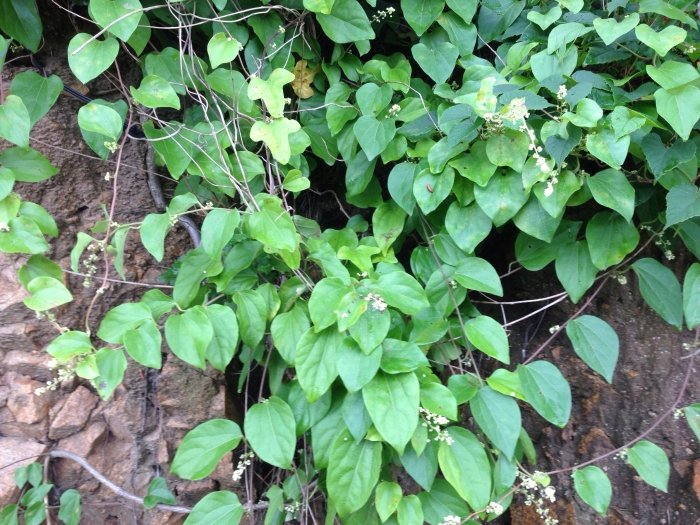Queen Coralbead
(Cocculus orbiculatus)
Queen Coralbead (Cocculus orbiculatus)
/
/

Kim, Hyun-tae
CC BY 4.0
Image By:
Kim, Hyun-tae
Recorded By:
Copyright:
CC BY 4.0
Copyright Notice:
Photo by: Kim, Hyun-tae | License Type: CC BY 4.0 | License URL: http://creativecommons.org/licenses/by/4.0/ | Rights Holder: Kim, Hyun-tae | Publisher: iNaturalist | Date Created: 2016-07-30T01:58:35Z |





















Estimated Native Range
Summary
Nephroia orbiculata, commonly known as Queen Coralbead, is a woody vine native to a variety of habitats in Asia including tropical and subtropical forests, thickets, and forest edges from India to Java. It thrives in moist, shaded environments and can often be found climbing trees or spreading across the forest floor. This species is characterized by its glossy, heart-shaped leaves and small, inconspicuous greenish-white flowers that bloom in the summer. The flowers give way to striking coral-red berries that are often used in floral arrangements.
Queen Coralbead is valued for its ornamental berries and its ability to cover unsightly areas quickly, making it a popular choice for ground cover in shaded garden spots. It requires consistently moist soil and does well in part shade to full shade conditions. While it is not particularly drought-tolerant, it can adapt to a range of soil types provided they are well-draining. Gardeners should be cautious when planting Cocculus orbiculatus, as it has the potential to become invasive outside its native range, outcompeting local flora and altering ecosystems.CC BY-SA 4.0
Queen Coralbead is valued for its ornamental berries and its ability to cover unsightly areas quickly, making it a popular choice for ground cover in shaded garden spots. It requires consistently moist soil and does well in part shade to full shade conditions. While it is not particularly drought-tolerant, it can adapt to a range of soil types provided they are well-draining. Gardeners should be cautious when planting Cocculus orbiculatus, as it has the potential to become invasive outside its native range, outcompeting local flora and altering ecosystems.CC BY-SA 4.0
Plant Description
- Plant Type: Shrub, Vine
- Height: 10-15 feet
- Width: 5-15 feet
- Growth Rate: Moderate, Slow
- Flower Color: N/A
- Flowering Season: Spring, Summer, Fall, Winter
- Leaf Retention: Deciduous
Growth Requirements
- Sun: Full Sun, Part Shade
- Water: Medium
- Drainage: Medium
Common Uses
Border Plant, Rabbit Resistant
Natural Habitat
native to a variety of habitats in Asia including tropical and subtropical forests, thickets, and forest edges from India to Java
Other Names
Common Names: Snailseed , Roundleaf Snailseed , Snail Creeper
Scientific Names: Cocculus orbiculatus , Bradleia nephroia , Cebatha cuneifolia , Cebatha farrandiana , Cebatha ferrandiana , Cebatha integra , Cebatha lonchophylla , Cebatha mollis , Cebatha orbiculata , Cebatha orbiculata f. macrophylla
GBIF Accepted Name: